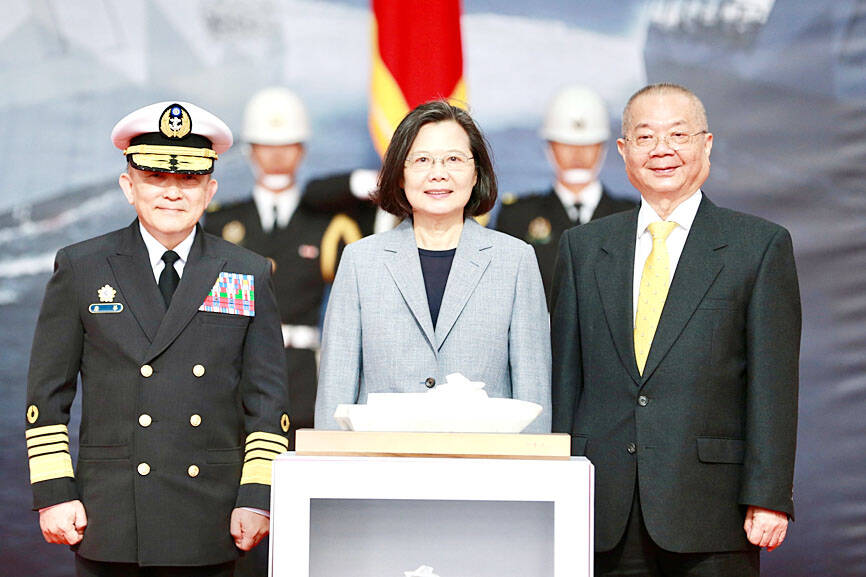Navy Commander Tang Hua (唐華) is to visit the US from next week to attend a military ceremony and discuss how to boost bilateral naval cooperation as China raises threats toward the nation, six people briefed on the trip said.
The security sources said that Tang would visit Hawaii, home of the US Indo-Pacific Command, for a Pacific Fleet change-of-command ceremony.
Three of them said that Tang was then expected to attend the April 8 to 10 Sea-Air-Space conference near Washington and that talks were under way to arrange a meeting with US Chief of Naval Operations Admiral Lisa Franchetti.

Photo courtesy of the Presidential Office
The sources spoke to Reuters on condition of anonymity given the trip’s sensitivity.
Two of the sources said that Tang’s visit is part of a US effort, called the Joint Island Defense Concept, to coordinate with Taiwan, Japan and others to counter China’s armed forces within the “first island chain” — a string enclosing China’s coastal seas that connects Japan, Taiwan, the Philippines and Borneo, an island split between Indonesia, Malaysia and Brunei.
Taiwan and the US are trying to line up a Tang-Franchetti meeting, which has not been confirmed, said one source, a US official.
Taiwan’s navy and the Pentagon declined to comment.
The Chinese Ministry of Defense did not respond to a request for comment.
The Chinese Ministry of Foreign Affairs said that it firmly opposed “military collusion” between the US and Taiwan, and that Washington should “refrain from sending out any erroneous signal to the forces of secession for the independence of Taiwan.”
Unlike visits to the US by senior officials from allies such as Japan and the UK, conducted openly, those of Taiwanese officials, especially military, are kept low key and often not officially confirmed.
Washington and Taipei have had no official diplomatic or military ties since 1979, when the US switched recognition to Beijing, although the US is bound by law to provide Taiwan with the means to defend itself.
China has not renounced the use of force to take Taiwan.
Taiwan’s navy is dwarfed by that of China, which is adding nuclear-powered submarines and aircraft carriers.
Under a modernization effort that President Tsai Ing-wen (蔡英文) has overseen, Taiwan is developing its own submarines, the first unveiled last year.
Without fanfare, Taiwan and the US have expanded their military cooperation since Tsai took office in 2016, especially since China began ramping up military pressure over the past four years.
Beijing now regularly sends fighter jets over the median line of the Taiwan Strait that once served as an unofficial barrier.
Previous trips by senior Taiwanese officers to the US have included then-navy chief Lee Hsi-ming (李喜明) in 2015 and Vice Minister of National Defense Hsu Yen-pu (徐衍璞), who last year attended a Taiwan-US defense industry conference in Virginia.
Taiwan typically holds annual security talks in the US, which neither government officially confirms. Last year they were attended by the minister of foreign affairs and the head of the National Security Council, Taiwanese media reported.
Tang on Tuesday accompanied Tsai to a naval base in Yilan County for a handover ceremony for two new Tuo Chiang-class corvette warships, which Taiwan’s navy calls “carrier killers” for their high maneuverability, stealthiness and anti-ship missiles.

The CIA has a message for Chinese government officials worried about their place in Chinese President Xi Jinping’s (習近平) government: Come work with us. The agency released two Mandarin-language videos on social media on Thursday inviting disgruntled officials to contact the CIA. The recruitment videos posted on YouTube and X racked up more than 5 million views combined in their first day. The outreach comes as CIA Director John Ratcliffe has vowed to boost the agency’s use of intelligence from human sources and its focus on China, which has recently targeted US officials with its own espionage operations. The videos are “aimed at

STEADFAST FRIEND: The bills encourage increased Taiwan-US engagement and address China’s distortion of UN Resolution 2758 to isolate Taiwan internationally The Presidential Office yesterday thanked the US House of Representatives for unanimously passing two Taiwan-related bills highlighting its solid support for Taiwan’s democracy and global participation, and for deepening bilateral relations. One of the bills, the Taiwan Assurance Implementation Act, requires the US Department of State to periodically review its guidelines for engagement with Taiwan, and report to the US Congress on the guidelines and plans to lift self-imposed limitations on US-Taiwan engagement. The other bill is the Taiwan International Solidarity Act, which clarifies that UN Resolution 2758 does not address the issue of the representation of Taiwan or its people in

US Indo-Pacific Commander Admiral Samuel Paparo on Friday expressed concern over the rate at which China is diversifying its military exercises, the Financial Times (FT) reported on Saturday. “The rates of change on the depth and breadth of their exercises is the one non-linear effect that I’ve seen in the last year that wakes me up at night or keeps me up at night,” Paparo was quoted by FT as saying while attending the annual Sedona Forum at the McCain Institute in Arizona. Paparo also expressed concern over the speed with which China was expanding its military. While the US

SHIFT: Taiwan’s better-than-expected first-quarter GDP and signs of weakness in the US have driven global capital back to emerging markets, the central bank head said The central bank yesterday blamed market speculation for the steep rise in the local currency, and urged exporters and financial institutions to stay calm and stop panic sell-offs to avoid hurting their own profitability. The nation’s top monetary policymaker said that it would step in, if necessary, to maintain order and stability in the foreign exchange market. The remarks came as the NT dollar yesterday closed up NT$0.919 to NT$30.145 against the US dollar in Taipei trading, after rising as high as NT$29.59 in intraday trading. The local currency has surged 5.85 percent against the greenback over the past two sessions, central